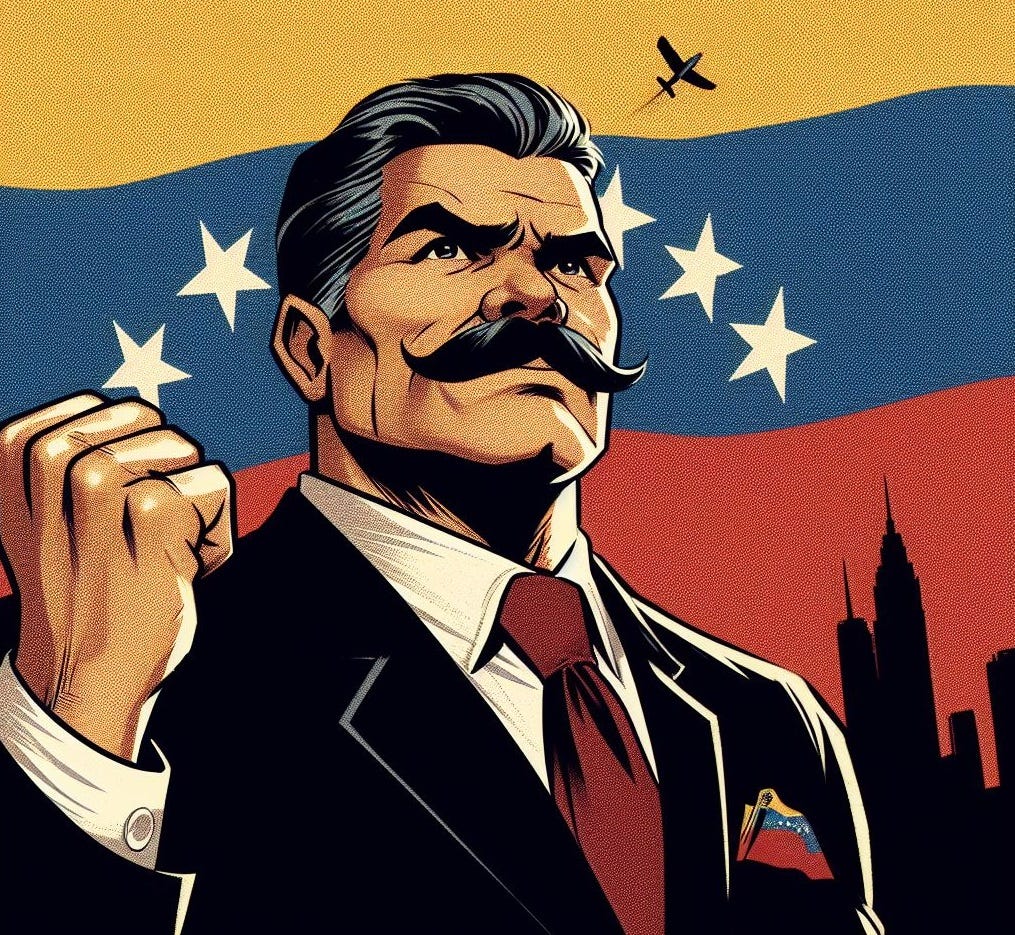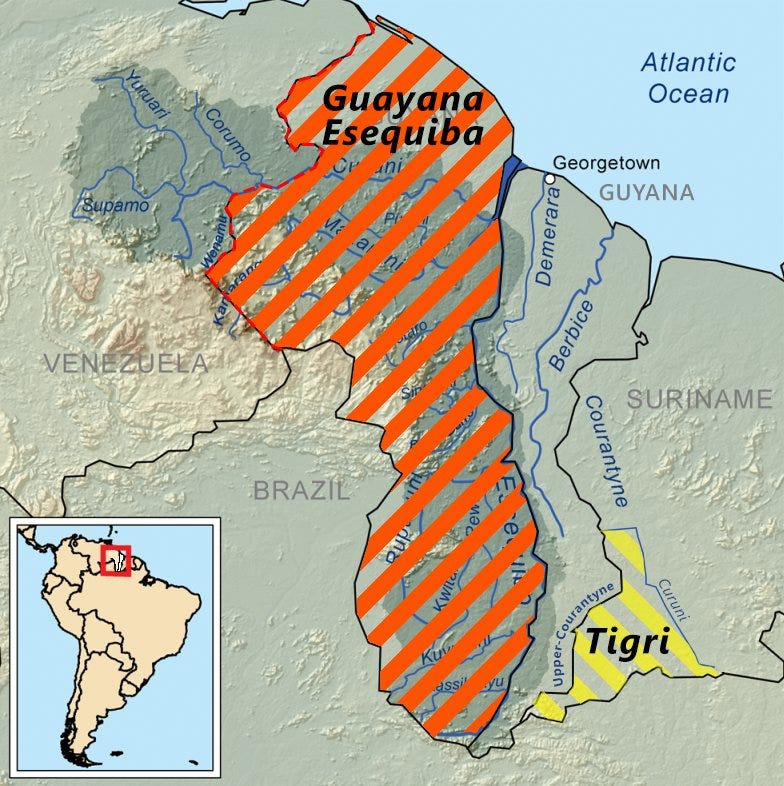Why Venezuela is very unlikely to go to War with Guyana
Despite some hysterics among western pundits, the current crisis is more about internal politics than conquest
On December 3, Venezuela’s ruling party held a referendum on whether to annex a large portion of neighboring Guyana called Esequibo. The vote passed overwhelmingly, though videos of empty polling stations dominated social media and some independent monitoring organizations estimated the turnout to be less than 8%.
President Nicolas Maduro, however, hailed the vote as a victory, and the government claimed 10.4 million votes, reawakening a longstanding crisis of credibility in the country’s official electoral results. The referendum followed months of nationalistic saber-rattling by the Maduro government.
Over the last few weeks, some media personalities unfamiliar with Venezuelan internal politics have broadcast their fears of a possible full-scale invasion of Guyana by Venezuelan armed forces. But most experts within Venezuela say the public statements and annexation propaganda have more to do with Maduro’s attempts to consolidate power and whip up nationalistic fervor ahead of elections next year than military conquest.
Maduro wasted no time however in announcing a series of measures to facilitate the annexation. On Tuesday he presented a new official map of Venezuela with Esequibo incorporated into Venezuelan territory and mandated all schools use it.
He also announced that Major-General Alexis Rodríguez Cabello will be the “provisional authority” in the disputed territory. In previous days Maduro had sent a small military contingent to Puerto Barima on the Venezuelan Atlantic region of the Guyana border.
But for now, the war is one of information and competing narratives rather than bullets and bombs.
The territory dispute dates back to 1777 when the Captaincy General of Venezuela included the 159,500-square-kilometer (61,600-square-mile) region into a map of the country despite the territory never having been occupied by Venezuela either when it was part of the Spanish empire or after independence.
In 1899, British Guyana managed to officially define its current borders in the Paris Arbitral Tribunal in a process that Venezuela claimed was rigged. Now more than a century later, after the discovery of substantial oil reserves in the region, Venezuela’s ruling party has been advocating for the usurpation of the region.
“We want the peaceful rescue of the Guayana Esequiba,” said Maduro on Tuesday. “Our Guayana Esequiba has been de facto occupied by the British Empire and its heirs and they have destroyed the area,” he said. Under the presidency of Hugo Chávez, Venezuela offered discounted oil to CARACOM, an intergovernmental organization of 14 countries in the nearby Caribbean, in exchange for diplomatic support for its claims on the region. But those countries have long supported Guyana's independence.
Maduro has instructed the state oil company PDVSA to draw up plans for the exploration and extraction of oil and mineral resources in Esequibo and ordered the National Assembly to draft a law canceling offshore oil contracts granted by Guyana. The U.S. company Exxon Mobile has a maritime platform in the area. “We are giving three months to the companies that are exploiting resources there without Venezuelan permission to comply with the law,” he said. The Venezuelan president also asked the National Assembly to create environmental protection areas and national parks in the territory.
As part of its rhetoric, the Venezuelan government has claimed that Exxon is conspiring with the U.S. and the international community to exploit the region, and has even gone so far as to issue arrest warrants for at least 10 members of the opposition for “treason” and “conspiring with or accepting payments from Exxon”.
The government has also banned opposition presidential candidate Marina Corchada, who won informal primaries in July, from participating in the 2024 elections.
Yet in recent months, Maduro has been clamoring for the removal of sanctions imposed by the U.S. as well as actively sought investments from U.S. companies. Chevron in particular has a large presence in the country.
Brazilian President, Luiz Inácio Lula da Silva, on Thursday, said in public statements that “Mercosur cannot remain aloof” from the Essequibo dispute and that Brazil will host “as many rounds of talks as necessary’ because ‘we don’t need more war”.
In recent days, Brazil has sent armored vehicles and troops to its borders with both Venezuela and Guyana.
Guyana for its part has reached out to the United Nations, Mercosur, and the U.S. for help in resolving the situation.
“We are very concerned that President Maduro and the government of Venezuela can use their own internal scenario and internal politics to create instability within our region, to create fear and terror within the hearts and minds of their neighbors,” said Guyanese President Mohamed Irfaan Ali Tuesday in an interview with France 24.
Ali pointed out that both countries are bound to the process of the International Court of Justice (ICJ) which in the Geneva Agreement of 1966 by decision of the Secretary-General of the United Nations ruled that the Essequibo region belongs to Guyana. Venezuela has insisted that the ICJ does not have jurisdiction to settle the dispute.
On Thursday, U.S Southern Command conducted flyovers over Guyana, saying in a statement that “The U.S. will continue its commitment as Guyana’s trusted security partner and promoting regional cooperation and interoperability.”
Despite the escalations, however, most experts believe that Venezuela is unlikely to invade Guyana. Maduro, who has held power since 2013, faces a dilemma around the upcoming presidential elections. Deeply unpopular, he is unlikely to win truly fair elections in 2024, even against a deeply divided and almost as unpopular opposition.
But his current self-created crisis could serve as an excuse to delay them or incriminate opposition politicians. His administration has been negotiating with the U.S. to continue easing economic sanctions, however, and moves towards more authoritarian sham elections, such as in Nicaragua, would undermine those efforts.
In the meantime, the symbol of Esequibo is powerful in Venezuela. Children have been taught for decades in state schools that the region belongs to them, and the idea of recovering it is deeply popular, even among his right-wing opponents.
And a surge in nationalistic sentiments among the population serves to distract from the myriad economic and environmental problems faced by the country’s residents. Some Western analysts have insisted that the Guyana “crisis” is an example of Maduro behaving irrationally.
But Maduro is not irrational. He has survived multiple international attempts to remove him from power and has long been underestimated by the international community. Maduro might not be a great leader in the sense that he affects positive change, but he understands Venezuelan politics and power dynamics extremely well, as he has proven again and again.
This latest episode of chest-beating is only likely to benefit him and his party internally, even if it means criticism from the international community.
The Big Stories in Latam
Guatemala continues to inch closer towards a “slow coup” against president-elect Bernardo Arévalo. Guatemala's Public Prosecutor's Office alleged on Friday that elections earlier this year, which Arévalo won overwhelmingly, are invalid due to “administrative irregularities by the Supreme Electoral Tribunal.”
The Prosecutor's Office, whom Arévalo de León accused last September of carrying out a "coup d'état" against him, indicated that the electoral records used in the elections "are null and void" since "they were not initially authorized" by the Supreme Electoral Tribunal.
The alleged invalidation of the electoral results presented by the prosecutor Leonor Morales, in a press conference, who said that the elections for president, deputies, mayor and deputies to the Central American Parliament should all be annulled.
Leaders from around the region condemned the move by the Prosecutor’s Office. The Organization of American States released a statement calling the process “a fundamental break of Democratic processes” and “political fraud against the clear will of the Guatemalan people”.
Ongoing protests against the sitting government, which we have covered here at PWS before, grew after the announcement, and are likely to keep growing until the situation is resolved.
Peru is also inching closer towards chaos. Amidst an ongoing power struggle between the president and the country’s Attorney General, Peru’s Constitutional Tribunal ordered the release of former President Alberto Fujimori. Fujimori was serving a 25-year sentence for his role in extrajudicial killings, abductions, enforced disappearances, and corruption.
The tribunal said that Inter-American Court orders not to release Fujimori were not binding. The court responded on December 5, ordering Peru “to refrain from implementing the Constitutional Tribunal’s ruling,” pending a review by the court of the pardon. The government ignored the ICJ and released Fujimori on December 6.
The decision illustrates a willingness by the current government to ignore International Law. “Fujimori’s release is a slap in the face to victims of atrocities,” said Juanita Goebertus, Americas Director at Human Rights Watch. “The OAS should examine the release in the context of very serious erosion of the rule of law and the protection of human rights in Peru.”
Also this week in Peru, the deeply unpopular Congress passed a series of laws that consolidate their power, and complicate upcoming elections. They also voted to remove the AG from office, though Benavides has so far ignored the order.
Spanish Word of the Week
Esequibo:
There has been some debate this week over the proper spelling of the region currently being eyed greedily by Venezuela. In Spanish, it is often spelled with one “s”, Esequibo. And sometimes it is referred to in the feminine: La Region Guayana Esequiba.
Guyana, for their part, spell it with two “s’s”- Essequibo.
It seems that even the spelling of the region is a source of some controversy, and the correct form of writing it changes depending on whom you ask.
This is all very confusing for us at Pirate Wire Services, but that's ok. We hope it gets sorted out soon. But we will eventually have to pick one of the spellings for consistency.
Which is your favorite? Please help us solve this dilemma.
Until then, Hasta pronto piratas!






I want to add on the case of a low probability of conflict. The Essequibo is mostly flooded jungle which makes an invasion campaign very unlikely. The terrain is a really big no-go. The army of Venezuela is also debilitated as it showed in the conflict against FARC in Arauca in 2022.
Hmm... sorry to be a bit critical. We fully get that the Spanish Word of the Week at the end is supposed to be a bit more light-hearted than the rest of the article. However, the end of this particular article felt a bit out of place to us - it almost sounds like “an actual shooting war breaking out would be nothing to worry about - as we would cover it here on PWS and also we would come up with a consistent spelling.”
Sure, you didn't write that exactly and maybe we are just in a super nitpicky mood, but it did come across a bit this way and we wanted to at least let you know. ^^'
Anyway, thank you so very much for covering this topic at all - we had no idea about any of this whatsoever! 💜